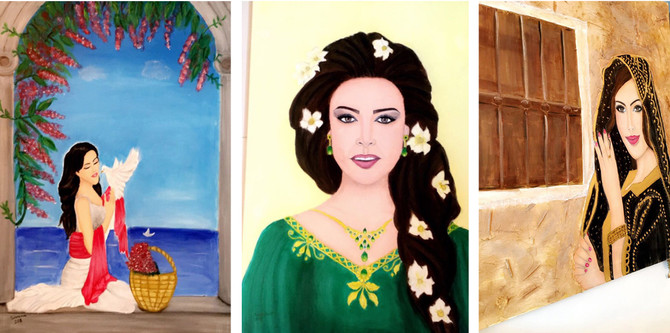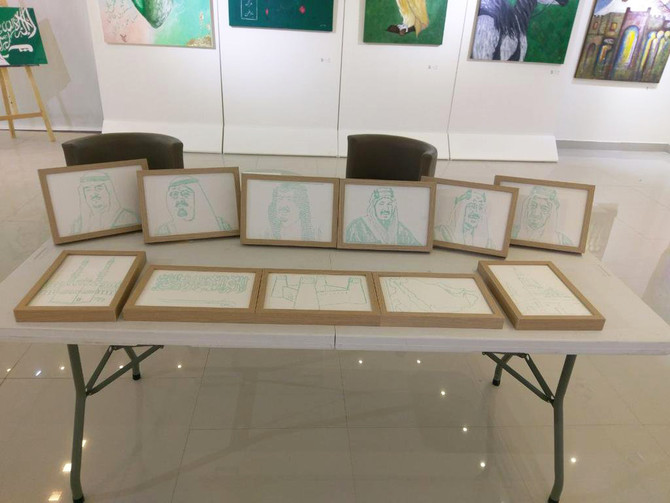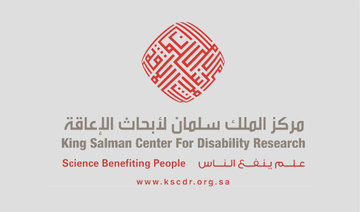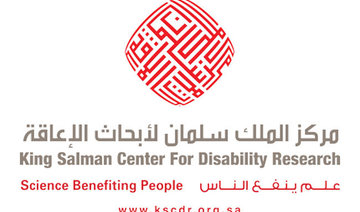RIYADH: Disability can be a social barrier if we let it be. This is the main message from inspirational people with a disability who insist on being visible and integrated into society. Arab News met three people with disabilities who have stories of determination, passion and willpower.
Omar Alsohibany is a 34-year-visually impaired man who is determined to encourage people with different types of visual impairment or total blindness to experience art. Alsohibany is also studying social services.
His main aim is to change the way society thinks about people with disability. “I want to inspire all people with disability in general and visually impaired or blind people specifically to overcome any challenge they might face,” he said.
His experience with art exceeded expectations and he has extended his work to Dubai and Cairo despite the struggles he has faced to prove to himself and society that he is a person with exceptional ability in this area.
Alsohibany said that the journey of integration and proving himself was full of roadblocks to acceptance and appreciation.
“I suffered from lots of difficulties. When I first joined the special education track for the visually impaired and blind people I noticed that we were restricted to doing only handicraft. That pushed me to think of how can visually impaired and blind people draw and paint.”
Since art was the only way to express himself, he decided to find a way almost nine years ago, asking people with this sort of disability to “see their thoughts.”
“I then began my research journey for three years,” he said. “In the meantime, I used my opportunity in learning English in the US to connect with experts to know more about the possibility of letting people with blindness or visual impairment experience art and be productive. Unfortunately, the interpreters at the time did not deliver what I wanted to say because they were simply not convinced of my point. I did not get an answer. I worked on myself; I bought the tools and went through trial and error.”
He did not mind the huge effort or experiences of failure. The result was using his Twitter account to share his art pieces with Braille techniques with the world and the publication of three books: One on his views of the Gulf Cooperation Council in terms of art and culture, and natural sightseeing through the use of Braille art.
Alsohibany has also participated in many exhibitions and events showcasing his beautiful works, sharing his experience and bringing people together. Methods included letting people with good sight paint while covering their eyes to appreciate the blessing they have and to experience how people with visual impairment or blindness live, and letting people with visual disability experience painting and experience masterpieces via touching big textures with Braille art techniques. He also includes names in the Braille language in addition to Arabic and English letters.
“I wanted people with my type of disability to live another life and think out of the box and simply draw and paint. However, I was not satisfied while sitting behind computer sharing my art through Twitter; I started to call event organizers to let me participate in their events and exhibitions.
“It was another big challenge, the majority refused and many of them did not want to even see what I had, just because I am a person with visual impairment. I gradually started to exhibit my work in exhibitions and events. I participated in different cities and universities and talked with new people to share my art and to say that disability can be another form of showing great ability.”
“We still need lots of enhancements in infrastructure such as elevators, stairs, etc. We still need barcodes at all public places, so blind people and the visually impaired can read and know where they are,” he said.
Amal Alsalhaby, who is blind, is studying special education. Her ambition knows no limits, and her writing talent allowed her to become a journalist and writer at Gharb Alekhbariya newspaper.
She is also an artist and a public speaker about her experience, and has a dream of being a specialized lecturer on how to communicate with people with blindness or visual impairment.
“I want to see the developments in the public’s mentality and I want to create awareness about people with disability. That is why I chose my major. I went through a lot of struggles. I went through hard times of being not accepted. Acceptance is an issue that can face anyone, not only people with disability.
“This experience has taught excellent lessons; we do not have to make blindness or any type of disability an excuse for not integrating in society. We can take the first step and break the ice. I met people who think of people with blindness as puppets who do not understand anything; through expressing my passion, I wanted to change this idea. People with blindness can be great contributors to their area of interest.”
She said that her integration with society happened gradually after depression and much difficulty. “My main advice is that we all as humans must fall down and stand up alone without the help of anyone. Because this is the only way that can make you believe in your ability and overcome your disability.”
Tahani Faris is a 26-year-old artist with a hearing disability. She has a bachelor’s degree in fine arts. Faris believes that people with all types of physical disabilities can integrate with society when they start viewing society as a place where they can add value “by having passion and expressing what you have in your heart.”
“You will definitely integrate in society no matter how difficult it can be at the beginning. It is our duty to make a difference in our society to help other people with disability live better and dream bigger. I went to lots of courses, not only because I want to learn but because I want to be visible to society. I want to integrate and not be restricted to one community.”
However, Faris believes that there is room for development to enhance the quality of life of people with disability, such as having more events and exhibitions where people with a disability can show their talents, and creating awareness of the importance of learning basic sign language to facilitate communication.

































